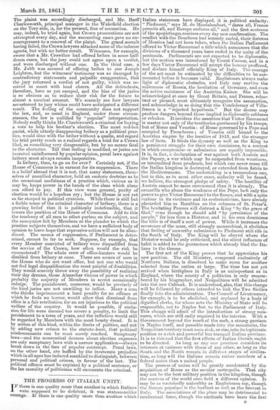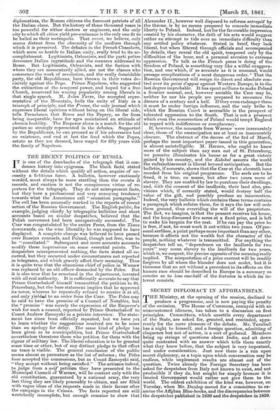THE PROGRESS OP ITALIAN UNITY.
IF there is one quality more than another in which Italians were supposed to be deficient, it was statesmanlike courage. If there is one quality more than another which Italian statesmen have displayed, it is political audacity. "Piedmont," says M. de Montalembert, "dares all, France permits all, and Europe endures all," and the first sentence of the apophthegm receives every day new confirmation. The conflict with the Bourbons had scarcely ended, their fortress of Messina had not been taken, when the Italian Parliament offered to Victor Emmanuel a title which announces that the divisions of a thousand year have ended in the unity of the peninsula. Parliaments are not expected to be diplomatic, but the motion was introduced by Count Cavour, and in a few days Victor Emmanuel will accept the honour proffered, and declare himself officially King of Italy. The courage of the act must be estimated by the difficulties to be sur- mounted before it becomes valid. E glishmen always make light of diplomatic obstacles, and Italy may survive the sullenness of Russia, the hesitation of Germany, and even the active resistance of the Austrian Kaiser. She will be acknowledged at once by Great Britain, and France, reluc- tant or pleased, must ultimately recognize the assumption, and acknowledge in so doing that the Confederacy of Villa- franca is a "rejected hypothesis." But the decree may produce dangers beyond those implied in diplomatic coldness or rebukes. It involves the assertion that Victor Emmanuel is master not only of the territories garrisoned by his troops, but of Rome and Venetia: of Rome governed by a Pope and occupied by Frenchmen ; of Venetia still bound to the Austrian empire by the treaties of 1815, and the stronger law of facts. It binds the dynasty as well as the King to a persistent struggle for their own dominions, to a contest in which compromise or submission are equally impossible. It is, in fact, a declaration of war against both Austria and the Papacy, a war which may be suspended from weariness, or intermitted from prudence, but which can never cease till the Italian kingdom is destroyed, or extended from Istria to the Mediterranean. The undertaking is a tremendous one, but in this, as in most other cases, audacity will be found, we believe, the strongest pledge of safety. The hostility of Austria cannot be more envenomed than it is already. The camarilla who abuse the weakness of the Pope, lack only the power to give Victor Emmanuel to the flames, and with a spite curious in its virulence and its ecclesiasticism, have already placarded him as Barabbas on the columns of St. Peter's. The hesitating Powers will distrust a King "by the grace of God," even though he should add "by permission of the people," far less than a Dictator, and in his own dominions the title is of itself a sort of power. While it increases the reverence of the mass, still strongly monarchical, it abolishes that feeling of unworthy submission to Piedmont still rife in the South of Italy. The King will be obeyed where the Dictator would be only criticized, and the silent influence of habit is added to the guarantees which already bind the Ita- lians to the throne.
The first act of the King proves that he appreciates his new position. The old Ministry, composed exclusively of Northern Italians, is dissolved to make room for another selected from the nation at large. The time has not yet arrived when birthplace in Italy is as unimportant as in England, where the county of a politician is only remem- bered by his biographer, and Neapolitans will be admitted into the new Cabinet. It is understood, also, that this change will be followed by others intended to link the Two Sicilies finally into the administration. The Council of Lieutenancy, for example, is to be abolished, and replaced by a body of dignified clerks, for whose acts the Ministry of State will be responsible, not to Naples but to the Parliament of Italy. This change will admit of the introduction of strong mea- sures, which are still sadly required in the interior. With a Government beyond the reach of the mob, a strong garrison in Naples itself', and passable roads into the mountains, the Neapolitan territory must soon sink, or rise,into its legitimate position as a rich and powerful but tranquil Italian province. It is to this end that the first efforts of Italian liberals ought to be directed. As long as any one province considers its interests at variance with those of any other, as long as the South and the North remain in different stages of civiliza- tion, so long will the Italians remain rather members of a federal union than a united people. The process of union will be greatly accelerated by the acquisition of Rome as the secular metropolis. That city may not be the best military position in the kingdom, though the masters of the world once held a different opinion. It may be as wretchedly unhealthy as Englishmen say, though the Roman populace is the burliest as well as the bravest in Italy. The associations of the place may be detrimental to intellectual force, though the cardinals have been the first diplomatists the Roman citizens the foremost patriots of all the Italian clans. But the history of three thousand years is too powerful for either doctors or engineers, and the only city to which all cities yield pre-eminence is the only one fit to be hailed as their metropolis. That event, we believe, only seems distant from the obscurity of the medium through which it is perceived. The debates in the French Chambers, which seem so hostile to Italian.unity, really tend to its ac- complishment. Legitimists, Orleanists, and the parti pretre denounce Italian ingratitude and the menaces addressed to Rome. But Legitimists, Orleanists, and the faction with whom they are momentarily allied, are not the classes who commence the work of revolution, and the really formidable party, the old Republicans, have thrown in their votes de- cisively against the Pope. Prince Napoleon, who suggested the extinction of the temporal power, and hoped for a free Church, recovered his waning popularity among liberals in that single speech. M. Jules Favre, the accepted repre- sentative of the Mountain, hails the unity of Italy as a triumph of principle, and the Presse, the only journal which expresses liberal opinions without beinc,° on the liberal side, tells Frenchmen that Rome and the Papacy, so far from being inseparable, have for ages maintained an attitude of chronic hostility. The Emperor alone is a match for the old parties so strongly represented in the debates. Supported by the Republicans, lie can proceed as if his adversaries had no existence, and end at last the feud which the Popes, astute as they are deemed, have waged for fifty years with the family of Napoleon.































 Previous page
Previous page